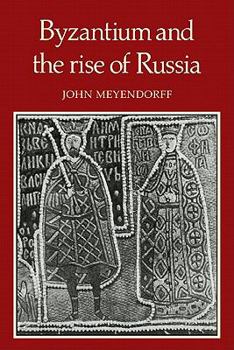Byzantium and the Rise of Russia: A Study of Byzantino-Russian Relations in the Fourteenth Century
Select Format
Select Condition 
Book Overview
The history of Russia is often considered as if that immense country had always been an isolated continent. However, at the time of its rise as a nation, it was politically a province of the Mongol Empire, whose capital was in Central Asia; and ecclesiastically, it was a dependency of the Orthodox Patriarchate of Constantinople, or Byzantium. This book describes the role of Byzantine (predominantly ecclesiastical) diplomacy in the emergence of Moscow...
Format:Paperback
Language:English
ISBN:0521135338
ISBN13:9780521135337
Release Date:June 2010
Publisher:Cambridge University Press
Length:350 Pages
Weight:1.13 lbs.
Dimensions:0.8" x 6.0" x 9.0"
Customer Reviews
3 ratings
A hard read, but very clarifying
Published by Thriftbooks.com User , 15 years ago
Many people think of the Byzantines as late decadents, lesser sons of great lords. And even at their greatest, so the argument goes, their glory was marred by caesaropapism. Meyendorff helps correct that misunderstnding. To understand the fading role of the late Byzantime empire, we must see it as aiming for an Orthodox Commonwealth. It was a supranational community of Orthodox Christians headed by Constantinople (262) or, as time would demonstrate, Russia. This is an important point because as the Byzantine empire faded politically, they found an important spiritual daughter in Mother Russia. Meyendorff goes on to show that the State, even if it chose patriarchs from time to time, did not control the Church. For example, while the state was held at the mercy of the Mongol Horde, the church leadership kept the country from faltering (incidentally, this is exactly the same thing that the late Patriarch Alexis II did at the transition from Sovietism to the Federation). Meyendorff gives a good discussion of the Hesychysts. The middle section was rather dense. The final chapters dealing with Lithuania were interesting and tantalizing. This book is careful scholarship. I learned a lot from it. I do have one fault: Meyendorff loves the passive voice. Meyendorff also gives a lot of theological jewels on theosis, Incarnation, and essence/energies.
Excellent; But Challenging
Published by Thriftbooks.com User , 16 years ago
Meyendorff's book is well done and terribly important. But his writing does leave a bit to be desired. He often employs the passive voice, which makes his narrative sometimes confusing. But we must admit that, in this observation, we have perhaps been spoiled by the wonderful work of Hilaire Belloc and Sir Steven Runciman. Within this work, Meyendorff describes the role of the Byzantine, or later Roman, Empire in the rise of Holy Russia. And this perspective is essential for a complete understanding of Orthodox, monarchial Russia. In truth, Russia became first part of the "Byzantine Commonwealth". Then, with the fall of Constantinople in 1453, Moscow actually became the leading city of Orthodoxy, in essence the "Third Rome". This book is also interesting and efficacious in its detailed description of the power politics surrounding the rise of Russia. Holy Russia was beset with enemies from the East, the Mongol hordes, as well as from the West, the Teutonic Knights and Lithuania. One of the most dramatic and interesting aspects of Meyendorff's account is his illuminating exposition of the struggle between old Rome and Moscow, the Third Rome, in this fascinating slice of history. We recommend Meyendorff's solid account to any who would seriously understand this very important aspect of world history. God bless.
outstanding history
Published by Thriftbooks.com User , 24 years ago
This is an excellent buy for the serious amateur history buff, especially those interested in the interplay of medieval religious and political factions in 14th century Europe. Meyendorff does a superb job of describing how Byzantium maintained its political influence despite its declining economic and military prowess. His focus is on Constantinople, but the intrigues of Russia, Lithuania and to a lesser extent Poland in the struggle for supremacy in Great and Little Russia are described also. He also deftly describes the ecclesiastical tension between the Papacy and the increasingly authoritarian Patriarch in the "Second Rome." For the price, this is one of the better buys out there for a medieval history afficionado.






